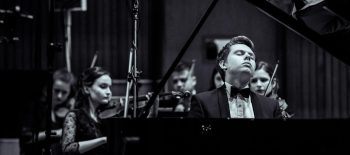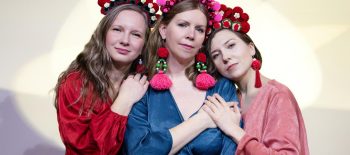Zuzanna Ginczanka, the Poetess between fear and hope
Polish Poetry Unites is a video series for anyone interested in literature, history and reading. In each episode Edward Hirsch, a distinguished American poet, and the president of the Guggenheim Memorial Foundation, will introduce a celebrated Polish poet to American audiences. The series is directed and scripted by Ewa Zadrzynska and produced by Bartek Remisko.
This episode of Polish Poetry Unites introduces the work of Zuzanna Ginczanka, originally Zuzanna Gincburg, to American audiences, one of the most talented and independent Polish poets of the 20th century, whose feminist poetry has only recently been properly acknowledged.
Born in Kiev in 1917, Zuzanna Ginczanka, a great Polish Jewish poetess was murdered by the Nazis in Kraków in 1944 at age 27, after more than two years spent in hiding. Anna Muller, Mira Rosenthal, and Joanna Trzeciak Huss have covered her work in a recent installment of our Encounters with Polish Literature video series hosted by David A. Goldfarb, PhD :
Following the exploration of Ginczanka’s poetry by Edward Hirsch (more below) the video showcases the biographical story of Lee Grant, Oscar winning actress and film director who is an admirer of Ginczanka’s poetry. Lee who was born just a few years later than Ginczanka shares her life experience touching on issues of politics and antisemitism. At 98 Lee Grant remains active and driven to make a positive impact on the world: the fascinating life that Ginczanka could have experienced if she had been born on this side of the Atlantic. The video ends with Lee reading Ginczanka’s poem Explenation in the Marigin from the collection Firebird which was just published by the New York Review of Books. The poems were translated by Alissa Vales.
In the video Edward Hirsch says: “Zuzanna Ginczanka is a wonderful person. Last year a biography was published in Poland and I very much hope it will be published here. There are three books coming out in English in the next few years so American readers are about to discover a really wonderful underrated poet. She was a Polish Jew, a Polish Jewish poet really, she was born in Ukraine, 1917. Part of the Russian empire, her family spoke Russian. She didn’t know any Yiddish. But, she loved Polish poetry and her friends spoke Polish. She decided that she wanted to be a Polish poet.
Her parents really abandoned her, she was raised by her grandmother. And when she was 18, she moved to Warsaw. There, she was taken up by Tuwim, the most important inter war Polish poet and the leader of Skamander…. She published only one book, it’s quite remarkable, it’s called On Centaurs. The metaphor of the centaur, which she takes from male poets and repositions it from a feminist perspective, is really half body half spirit. Half animal, half spiritual person. She was amazingly skillful as a poet and it’s very difficult for translators to capture her ability, especially her gift for rhyming which was admired by everyone. She was caught in the vice of being Jewish in Poland between the wars, and in the Nazi takeover she saw coming. She fled to Lviv, which was part of Poland. She went into hiding. her grandmother had given her everything from the family. And unfortunately for her, she was denounced by the concierge of the building who wanted her property and to get rid of her. She wrote her most famous poem in response, Non Omnis Moriar, based on a Horace poem.
There’s a famous Polish romantic poem called My Testament, (by Juliusz Słowacki) which she basically rewrote in a very bitter way. After the war, the poem was used to convict the concierge and her son for turning her over to the Nazis and stealing her property.
She escaped for some time, no one knows exactly how, but she moved to Kraków and went into hiding. She was eventually caught by the Nazis. She was arrested, no one knows exactly how she was killed, but there’s a consensus that she was shot and murdered in 1944. She was very young, but she had written all these poems, not just the poems that survived. And her legend lived on. Polish poets have always known how good she was, and now she’s finally having her day. Her life was short but her poems are permanent.”
The video about Zuzanna Ginczanka from POLISH POETRY UNITES video series was realized with additional support from the Taube Philanthropies and following partners: The New York Review of Books, New York Women in Film & Television and Museum of Literature [Muzeum Literatury] in Warsaw, Poland.
Wyjaśnienie na marginesie
by Zuzanna Ginczanka
Nie powstałam
z prochu,
nie obrócę się
w proch.
Nie zstąpiłam
z nieba
i nie wrócę do nieba.
Jestem sama niebem
tak jak szklisty strop.
Jestem sama ziemią
tak jak rodna gleba.
Nie uciekłam
znikąd
i nie wrócę
tam.
Oprócz samej siebie nie znam innej dali.
W wzdętym płucu wiatru
i w zwapnieniu skał
muszę
siebie
tutaj
rozproszoną
znaleźć.
(wiersz z tomu Zuzanna Ginczanka, „O centaurach”, Warszawa 1936)
Explanation in the Margin by Zuzanna Giczanka Translated from the Polish by Alissa Valles
I did not rise
from dust,
I will not turn
to dust.
I did not descend
from heaven
and I won’t return
to heaven.
I myself am heaven,
like a glass vault.
I myself am earth,
like fertile clay.
I haven’t fled
from anywhere
nor will I return
there.
I know no remove but myself.
In the wind’s swelling lung
and in calcifying rock
I must
find myself
as I am
scattered
here.
(from “Firebird” published by the New York Review of Books, 2023)
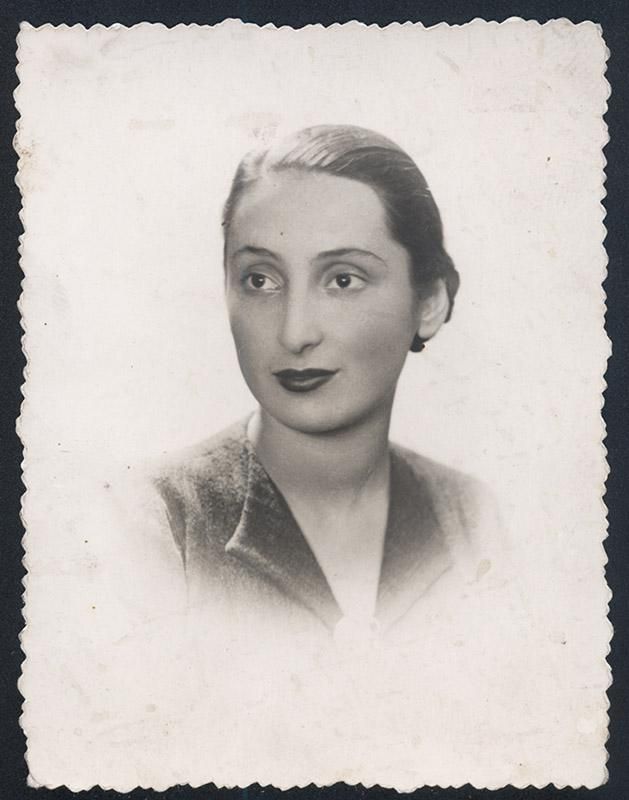
Zuzanna Ginczanka’s ID photo, 1938; photo: Adam Mickiewicz Museum of Literature, Warsaw
Zuzanna Ginczanka (1917–1945) was a Polish-Jewish poet and satirist. Born in Kyiv, Ginczanka was raised in Rowne, where her parents settled after fleeing from the Russian Civil War. Ginczanka was highly active in the Skamander poetic group, and her writing for Szpilki and Skamander magazines earned her a reputation as one of the most talented poets of the interwar period. In 1936, Ginczanka published her only volume of poetry, O Centaurach (About Centaurs). In 1945, Ginczanka was arrested and executed in Krakow, shortly before the end of World War II. Zuzanna Ginczanka’s last poem, “Non omnis moriar…” (“Not all of me shall die”), written shortly before her execution by the Nazis in the last months of World War II, is one of the most famous and unsettling texts in modern East European literature: a fiercely ironic last will and testament that names the person who betrayed her to the occupying authorities as a Jew, it exposes the hypocrisy at the heart of Polish nationalist myths. Ginczanka’s linguistic exuberance and invention—reminiscent now of Marina Tsvetaeva, now of Marianne Moore or Mina Loy—are as exhilarating as the passionate fusion of the physical world and the world of ideas she advocated in her work. Firebird brings together many of Ginczanka’s uncollected poems and presents On Centaurs, her sole published book, in its entirety.
Biography source: the NYRB
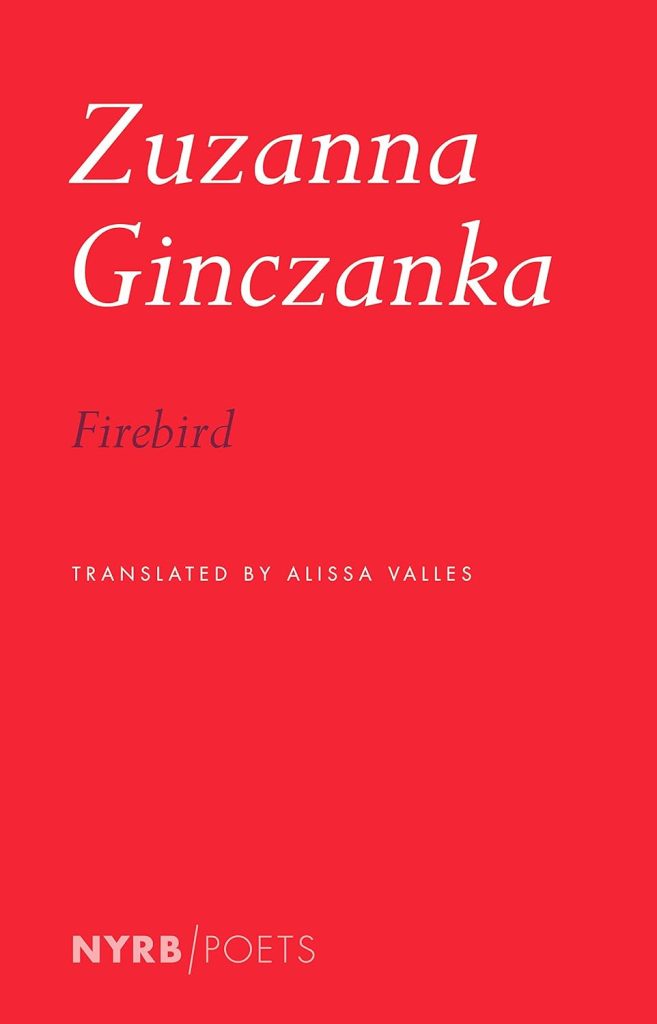
More about Zuzanna Ginczanka
On Centaurs & Other Poems (Poems by Zuzanna Ginczanka Translated from the Polish by Alex Braslavsky)
from: About Centaurs by Zuzanna Ginczanka
Poetry Poised to Take Flight: Zuzanna Ginczanka’s On Centaurs and Other Poems
Zuzanna Ginczanka Biographical Note
Zuzanna Ginczanka / Poetry Foundation
Not Everything Dies / Poetry Foundation
GINCZANKA – POET, PRISM, PROPHET
SOMETHING OR OTHER: THE PORTRAIT OF ZUZANNA GINCZANKA
(Non-)Presence: Capturing Zuzanna Ginczanka
Zuzanna Ginczanka’s Beauty & Brand
Invoking Zuzanna Ginczanka: Translation in a Time of Love & War
Zuzanna Ginczanka. Only Happiness is Real Life Exhibition in Lviv
Zuzanna Ginczanka. Only Happiness Is Real Life Exhibition in Warsaw and Kraków
The Crash of Silence on Silence: Polish Poetry & the Holocaust
The Holocaust in Polish Literature: 7 Key Books
Moderator: Edward Hirsch
Director: Ewa Zadrzyńska
Cinematography: Daniel Marracino
Editor: Anna Jędrzejewska
Music: Cezary Skubiszewski
Executive Producer: Bartek Remisko
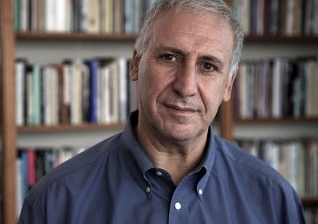
Edward Hirsch is an American poet and critic who wrote a national bestseller about reading poetry entitled How to Read A Poem And Fall In Love With Poetry published in 2014. He has published nine books of poems, including The Living Fire: New and Selected Poems (2010) and Gabriel: A Poem (2014), a book-length elegy for his son that The New Yorker called “a masterpiece of sorrow.” He has also published five prose books about poetry. His latest book of essays, 100 Poems to Break your Heart was published in 2021. He is president of the Guggenheim Memorial Foundation in New York City. Currently he is finishing a book of essays called The Heart of American Poetry. It will be published in April to mark the fortieth anniversary of the Library of America. The book consists of deeply personal readings of forty essential American poems. It rethinks the American tradition in poetry. Ed Hirsch lives in New York City.
Lead image: Zuzanna Ginczanka, 1938, fot. Muzeum Literatury / East News



